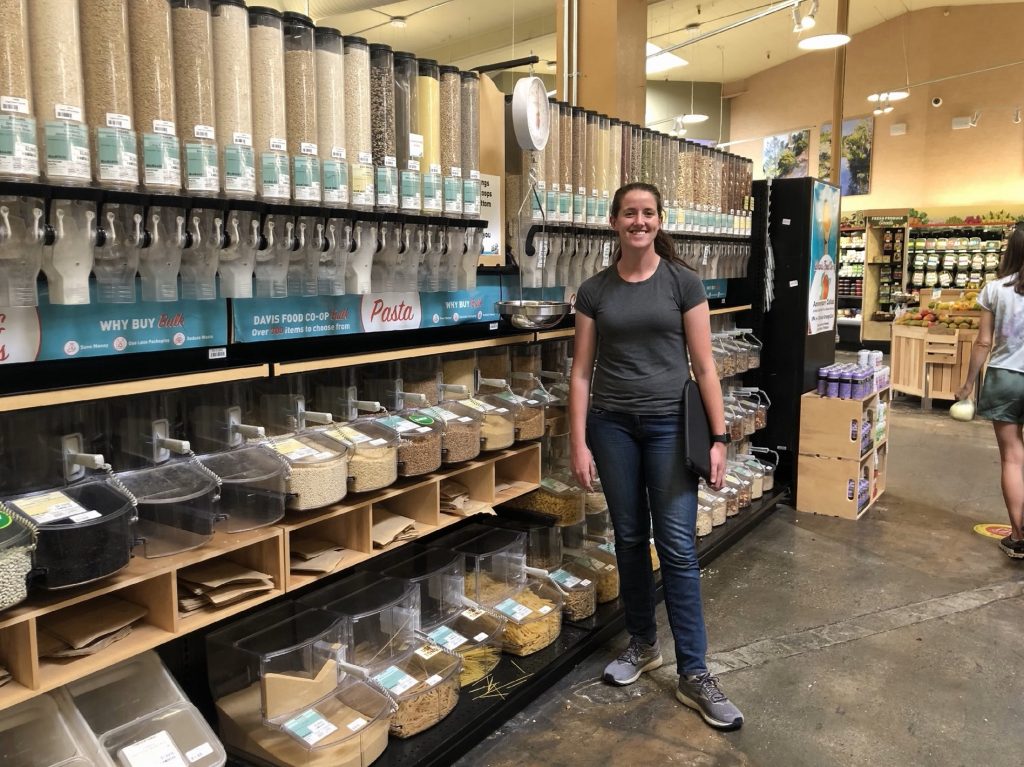Local Businesses Help Customers Reduce Single-Use Plastic
By Dylan Ehlers and Dylan Jayalath
Single-use plastics are plastic products that are used once, or for a very short amount of time, before being thrown away. These plastics are most seen in drinking bottles, food wrappers, plastic grocery bags, and straws, but they also show up in our shopping carts every time we buy shampoo, detergent, and liquid hand soap. Half of all plastic produced worldwide is single-use, and that has led to an estimated 400 million tons of plastic waste each year.
This has impacts on both the environment and health. Single-use plastics don’t biodegrade, but rather break down into microplastics. These microplastics — sometimes so small they are no longer visible to the naked eye — pollute our water and food sources. Airborne microplastics can enter our lungs through inhalation and absorption and are associated with many hormone-related cancers.
Taking bulk seriously: The Davis Food Co-op
To combat the surge of plastic wrappings, some local businesses such as the Davis Food Co-op sell goods in bulk, allowing the customer to buy more goods with less plastic. As the Co-op website puts it, “Bulk packaging is a great option for reducing waste and saving money.” The Co-op is a longtime Cool Davis partner and supporter.
Upon entering the Co-op, one of the very first things you see is the bulk buying section. These aisles contain options from trail mix to flour, but the majority of sales come from bulk nuts and coffee. The Co-op also offers the option to bring your own container, which significantly reduces the amount of plastic used. Co-op board member Sam Conselman reported that “Bulk sales are usually around 1 million [transactions] per year”.
Bulk buying has been a part of the Co-op since its establishment in 1972. Throughout this period, the Co-op has encountered various challenges, but perhaps none greater than those presented by the pandemic. In the beginning of the pandemic, the Co-op had to shut down bulk buying entirely. However, as businesses were allowed to re-open they were able to bring it back, albeit with some limitations, for example safety protocols prevented customers from bringing their own containers.
Throughout the year of 2021, bulk sales were down 5% from previous years, and even with customers now able to bring in their own containers, sales are actually down 10% from pre-pandemic levels. Unfortunately, as with many other parts of the economy, supply chain outages are presenting major challenges to the Co-op’s bulk buying program. Still, Conselman strikes a tone of perseverance. “Staff are continuously assessing and trying to work with new providers for bulk,” she notes.



Two Moms offer plastic-free products and refills on the go: The Davis Refillery
The Davis Refillery is taking a slightly different approach to reducing plastic waste. Started by two local moms in the middle of the pandemic, the Davis Refillery aims to provide household items sourced locally, with as little environmental impact as possible. Co-owner Amanda Banks explained during the pandemic, “everyone was trying to avoid anything being touched by another person, so everything was being extra wrapped in plastic.”
In its online catalog, the Davis Refillery offers a number of plastic-free alternatives to traditional household items with bamboo toothbrushes, biodegradable sponges, and many others. The Refillery’s best selling items, however, are their refillable detergents, shampoos, and conditioners. With no current storefront location, the Refillery delivers refills to your home, swapping out empty bottles for fresh full ones. In under a year of operation Banks estimates they have made approximately 3,300 refills, diverting hundreds of pounds of plastic from the local waste stream.
There are many challenges in getting people to change deeply ingrained consumer habits associated with products packaged in single-use plastic and switch. According to Banks, “it’s sometimes hard to get people to try new things,” however, “outreach events really help because people can see the product, [and] we can also talk to them in person and answer any questions they have.” Banks hopes to open a storefront location sometime soon to make products more accessible for customers and hopefully increase the Refillery’s impact reducing single-use plastic in our local waste stream.


Make the switch and ditch single-use plastics
Although the Davis Food Co-op and Davis Refillery use slightly different methods, they are both reducing the amount of single-use plastics consumed locally. Each faces challenges, but they’re working around them to try to get more people to switch to more sustainable behaviors. You too can help reduce the quantity of single-use plastics in the environment by shopping with the Co-op, Refillery, or other businesses engaging in similar practices that utilize reusable containers instead of single-use plastic packaging.
Links
City of Davis Food Packaging Ordinance
City of Davis Solid Waste and Recycling
City of Davis Composting
FACEBOOK FEED
Happy Earth Day Yolo County! Please stand with Cool Davis and Give Big today. It's a beautiful day but the house is truly on fire. Your donation helps us keep afloat and douse the flames. #EarthDay2024 #bdog2024 Davis City City of Winters, CA City of West Sacramento, Government City of Woodland Yolo County Climate Action and Sustainability Valley Clean Energy UC Davis Sustainability
www.bigdayofgiving.org/cooldavis
... See MoreSee Less
Photos from Cool Davis's post ... See MoreSee Less






